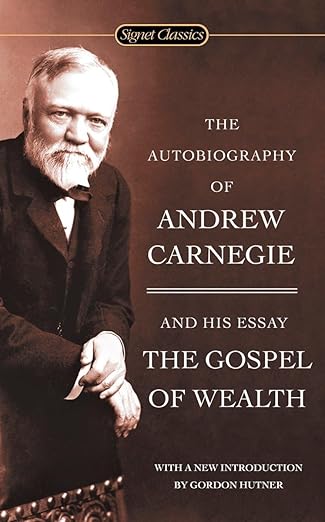
Andrew Carnegie’s life story is a classic tale of rags to riches, filled with valuable lessons on ambition, perseverance, philanthropy, and the true meaning of wealth. “The Autobiography of Andrew Carnegie” provides an intimate look at the journey of one of the most influential industrialists and philanthropists of the 19th century.
In this review, we’ll explore the key themes, insights, and takeaways from this fascinating autobiography.
The Autobiography of Andrew Carnegie
Early Life and Humble Beginnings
Andrew Carnegie was born in 1835 in Dunfermline, Scotland, into a modest family.
His father was a handloom weaver, and as industrialization began to impact their livelihood, the family decided to emigrate to the United States in search of better opportunities.
This decision marked the beginning of Carnegie’s journey toward becoming one of the wealthiest men in the world.
The autobiography vividly captures the struggles and challenges Carnegie faced during his early years.
Working as a bobbin boy in a cotton factory at a young age, he quickly learned the value of hard work, resilience, and the importance of education.
His rise from these humble beginnings is a testament to his unwavering determination and entrepreneurial spirit.
The Rise of a Business Magnate
One of the most compelling aspects of “The Autobiography of Andrew Carnegie” is the detailed account of his rise in the business world.
Starting as a telegraph messenger boy, Carnegie’s curiosity and willingness to learn propelled him into the railroad industry.
His keen observations and innovative ideas helped him climb the corporate ladder, eventually leading him to invest in various industries, including iron and steel.
Carnegie’s business philosophy centered on efficiency and innovation. He believed in surrounding himself with capable people and adopting new technologies to stay ahead of the competition.
This mindset played a crucial role in the success of the Carnegie Steel Company, which became the largest and most profitable industrial enterprise of its time.
Philanthropy and the Gospel of Wealth
A significant portion of Carnegie’s autobiography is dedicated to his philanthropic endeavors and his philosophy of wealth distribution.
Carnegie firmly believed that the rich have a moral obligation to use their wealth for the greater good of society.
His essay “The Gospel of Wealth” articulates this belief, advocating for the responsible use of wealth to promote education, culture, and public welfare.
Throughout his life, Carnegie donated vast sums of money to establish libraries, universities, and other educational institutions.
His commitment to philanthropy is evident in the numerous Carnegie libraries and foundations that continue to impact society positively.
Lessons on Leadership and Success
Carnegie’s autobiography offers invaluable lessons on leadership and success.
His emphasis on the importance of self-improvement, lifelong learning, and adaptability are recurring themes throughout the book.
Carnegie’s belief in the power of optimism and persistence serves as a source of inspiration for aspiring entrepreneurs and leaders.
One notable quote from the book is:
“The secret of success lies not in doing your own work, but in recognizing the best person to do it.”
This insight underscores the importance of delegation and trusting others, a principle that Carnegie applied effectively in his business ventures.
Read Also: 163 Andrew Carnegie Quotes That Built an Empire of Success
Reflections on Wealth and Legacy
As Carnegie reflects on his life and achievements, he emphasizes that wealth should not be an end in itself but a means to create positive change.
His introspective thoughts on legacy and the impact of his philanthropic work provide a profound perspective on the true meaning of success.
Carnegie’s decision to give away the majority of his fortune before his death exemplifies his belief that wealth should be used to benefit society.
His legacy as a philanthropist continues to inspire individuals and organizations worldwide to contribute to the betterment of humanity.
Criticisms and Controversies
While “The Autobiography of Andrew Carnegie” is an inspiring account of success and philanthropy, it is not without its criticisms.
Some readers argue that Carnegie’s portrayal of his business practices glosses over the harsh realities faced by workers in his factories.
The infamous Homestead Strike of 1892, which led to violent clashes between striking workers and security forces, is often cited as a blemish on his legacy.
Additionally, Carnegie’s emphasis on philanthropy has been scrutinized by some who question whether his philanthropic efforts were sufficient to atone for the labor disputes and working conditions during his industrial reign.
Conclusion: The Autobiography of Andrew Carnegie
“The Autobiography of Andrew Carnegie” is a captivating and insightful read that offers a window into the life of one of history’s most influential figures.
Carnegie’s journey from a poor immigrant to a titan of industry and a champion of philanthropy provides valuable lessons on ambition, leadership, and the responsible use of wealth.
The book challenges readers to reflect on their own definitions of success and encourages a commitment to lifelong learning and giving back to society.
Whether you are an aspiring entrepreneur, a student of history, or simply someone seeking inspiration, Carnegie’s autobiography is a must-read that will leave a lasting impression.
In Carnegie’s own words:
“No man can become rich without himself enriching others.”
This sentiment encapsulates the essence of his life’s work and serves as a guiding principle for anyone striving to make a meaningful impact in the world.